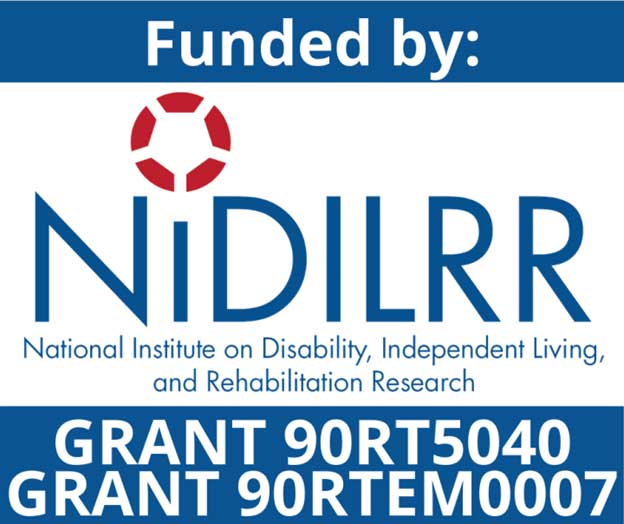Enhancing Employment Outcomes for Persons with Blindness or Low Vision
These courses share information about employment-related research and the implications for professionals who work with people who are blind or have low vision.
- Advice for VR Professionals: Evidence for Effective Meetings with Employers
- Career Advancement and Job Retention: Information Concerning Persons with Vision Loss
- Employment Mentoring for College Students with Visual Impairment
- Employment Outcomes of SSDI Beneficiaries
- Exploring Self-Employment Beyond the Business Enterprise Program
- Job Retention: Perspectives of Individuals with Blindness and Low Vision
- Job Search Skills Training for Transition-Age Youth
- Partnering with Families to Support Employment Outcomes
- Pre-Employment Transition Services: A Model for Vocational Rehabilitation Professionals Working with Students and Youth with Visual Impairments
- Understanding and Overcoming Transportation Barriers
- Virtual Interview Training for Transition-Age Youth: Putting Research Into Practice
- Vocational Rehabilitation Service Models for Consumers who are Deaf-Blind
- Working with Employers: Why it is Important and What Successful Agencies Do
View Enhancing Employment Outcomes Courses
Improving Business Development Skills: A Training for Rehabilitation Professionals
Most VR counselors work with businesses, but many are uncomfortable with this part of their job. This multimodule course addresses counselors’ knowledge and skills related to engaging with employers to help them learn how to be successful at it.
Blindness & Low Vision Certificate Program for Business Development Professionals
This program was developed in response to requests from VR agencies and is a compilation of five existing NRTC courses that provide foundational information for business development professionals who do not have experience working with individuals with blindness and low vision. A certificate of completion is provided.
Working with Adults who are Blind
The following courses were developed by the NRTC’s Older Individuals who are Blind Technical Assistance and Training Center (OIB-TAC), which provides training and technical assistance to professionals who serve older individuals who are blind or have low vision.
Some of these courses are appropriate for professionals serving adults of any age, such as:
- Adaptive Blind and Low Vision Skills for Everyday Living
- Basics in Program Evaluation
- Basics of Blindness and Low Vision
- Braille: What it is, and Why it is Important
- Beyond Acuity: Addressing Functional Aspects of Lack of Depth Perception and Visual Field Deficits
- Case Management Documentation
- Diabetes & Visual Impairment
- Functional Independent Living Assessment (FILA) Training
- Identifying Mental Health Impairments in Adults
- Orientation and Mobility for Those Who Have Multiple Health Impairments
- Strategies for Teaching Older Adults with Vision Loss
- Teaching Adaptive Techniques to Woodworkers and Carpenters who are Blind or Vision Impaired
- Teaching Braille to Adults
- Teaching iPhone for Low Vision: Where Do I Start?
- Understanding Cultural Differences and Their Impact on Service Delivery
- VoiceOver on the iPhone: Where Do I Start?
- Vision and Hearing Loss
Other courses are specific to older adults or the OIB program:
- An Overview of Independent Living Services for Older Individuals Who are Blind
- Best Practices in the Administration of the OIB Program
- Cardiovascular Disease and Aging
- Community Outreach: An Overview
- Community Outreach: Creating Targeted and Accessible Presentations
- Fall Prevention: Interventions for Older Individuals who are Visually Impaired
- How Social Determinants of Health Relate to Vision and Aging
- Introduction to Best Practices for Older Individuals who are Blind Programs
- Mobility Impairments: Implications for Service Providers
- Pulmonary Conditions Affecting Older Persons
- Sew Independent: Teaching Sewing to Individuals with Vision Impairment
- Social Isolation, Aging, and Vision Loss
- T.I.P.S. for Helping People with Vision Problems
- Understanding Data Collection and the 7-OB Report for OIB Programs
- Understanding People Living with Dementia and Vision Loss
- Walkers, Crutches, and Support Canes… Oh My! Orientation and Mobility for People with Orthopedic Impairments
For a list of other courses related to working with older individuals who are blind, visit the OIB-TAC Community of Practice website.
VRT Topics
These courses provide basic information on special topics for rehabilitation professionals.
- Accessing Textbooks and Reading Material
- An Overview of Assistive Technology for People Who Are Blind or Have Low Vision
- Assistive Technology for Individuals who are Blind or Visually Impaired in the Workplace
- Care for Occupational Therapy Patients with Low Vision: A Model for Building Successful Partnerships
- Facilitating Family Support
- Gearing Up for Transit: Options and Advocacy Skills for People who are Blind or have Low Vision
- Intake & Assessment: Setting the Stage for Success
- Neuropsychological Evaluation of Individuals with Visual Impairment or Blindness
- Practical Information for Social Workers New to Interacting with Older Adults Experiencing Vision Impairments or Blindness
- SMART Instruction
- Strategies for Mentoring Interns: Developing Qualified Professionals for the Future
- Teaching Adaptive Techniques to Woodworkers and Carpenters who are Blind or Vision Impaired
- The Basics of Brain Injury and Vision Loss
- The Low Down on Low Vision
- The Process of Teaching Art
- Understanding Cultural Differences and Their Impact on Service Delivery
- Understanding Social Security Work Incentives: It's Easier Than You Think
Common Eye Conditions
These courses are taught by a nonphysician and offer a basic overview of eye conditions from a rehabilitation professional. Questions concerning specific individuals should be directed to a qualified personal eye care physician.
Randolph-Sheppard Staff Training
This course is designed to orient new staff to the Randolph-Sheppard Business Enterprise Program; anyone, including blind entrepreneurs and VR staff, are welcome to take this course. Note: No continuing education credits are offered for this course.
